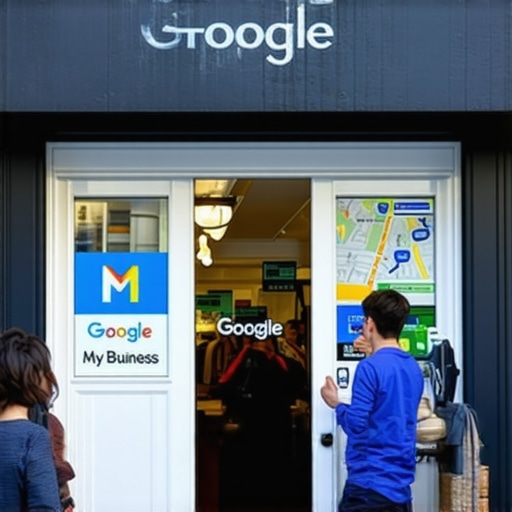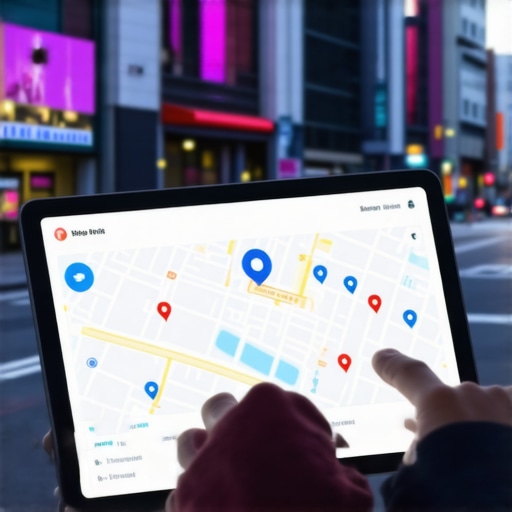Unlocking the Secrets of GMB Optimization: Your Ticket to Local SEO Glory
Imagine this: you’re a local business owner, passionate about your craft, but somehow your shop remains hidden in the digital shadows. It’s a familiar story, isn’t it? Well, fear not! Today, we’re diving into the vibrant world of Google My Business (GMB) optimization, a game-changer for local SEO. Think of it as giving your business a shiny new badge that screams, “Hey, I’m right here!” to potential customers.
Why GMB Is the Unsung Hero of Local SEO
Before we get into the nitty-gritty, ask yourself: Are you truly leveraging your GMB profile to its fullest potential? If not, you’re leaving gold on the table. GMB is more than just a listing; it’s a powerful local search engine that can propel your business to new heights. According to experts at Rank Search Now, optimizing your profile can significantly enhance your visibility and customer engagement.
Getting Your Hands Dirty: Practical GMB Optimization Tips
Is Your NAP Consistent and Accurate? Or Are You Playing Hide and Seek?
One of the foundational pillars of effective GMB optimization is ensuring your Name, Address, and Phone Number (NAP) are consistent across all platforms. Discrepancies here can confuse Google’s algorithms and dilute your local SEO efforts. Remember, consistency is key! Double-check your NAP details on your website, social media, and local directories.
Now, let’s talk about adding some sparkle to your profile—images! Bright, high-quality photos of your business, staff, or products can boost engagement and trust. And don’t forget to keep your hours updated; nobody likes showing up to a closed sign!
Can Your Customers Find You in a Crowd?
The answer hinges on your reviews and ratings. Encourage satisfied customers to leave positive feedback. Responding to reviews, both good and bad, shows that you care about your community—a vital aspect for local SEO. Remember, reviews are social proof that can sway potential customers in your favor.
What’s the Secret Sauce to Outranking Your Competitors?
According to Rank Search Now, the secret lies in consistent, strategic updates to your GMB profile combined with local keyword integration. Use keywords naturally in your business description, services, and even in your posts. This helps Google understand what you do and who you serve.
Finally, keep an eye on insights! GMB offers analytics that reveal how customers find and interact with your listing. Use this data to refine your strategies over time.
So, are you ready to turn your GMB profile into a lead-generating powerhouse? Dive into these tips, share your success stories, or ask questions below. After all, local SEO is a marathon, not a sprint—so keep optimizing and stay ahead of the curve!
The Power of Localized Content: How to Speak Your Community’s Language
One often overlooked yet highly effective tactic is crafting localized content that resonates deeply with your community. Instead of generic descriptions, incorporate local landmarks, events, and community issues into your posts and updates. This not only boosts relevance but also signals to Google that your business is a vital part of the local fabric. For example, regularly updating your GMB with posts about local festivals or charity events can enhance engagement and visibility. According to Rank Search Now, integrating localized keywords and community-specific content is a proven method to outperform competitors in local search rankings.
How Can You Leverage User-Generated Content to Your Advantage?
Encouraging customers to share their experiences through photos, reviews, and testimonials can exponentially increase your GMB profile’s credibility. This form of social proof not only influences potential customers but also enriches your listing with fresh, authentic content. Implement strategies like offering incentives or creating hashtag campaigns to gather user-generated content. This approach aligns with the findings of Rank Search Now, which emphasizes that active engagement with customer content can significantly improve local search rankings and conversion rates.
Are You Ready to Optimize Your GMB for Voice Search in 2024?
As voice search continues to grow, optimizing your GMB profile for voice queries becomes crucial. Think about how people ask questions about local services—using natural language and long-tail keywords. Incorporate these conversational phrases into your profile description, FAQs, and service listings. For instance, phrases like “Where can I find the best pizza near me?” or “Is there a reliable plumber in downtown?” should be naturally integrated into your content. This nuanced approach to voice search optimization can dramatically increase your chances of appearing in voice-based local searches, a trend highlighted by Rank Search Now. Want to stay ahead of the curve? Explore more about how to boost your local search presence with expert strategies.
Don’t forget to share your insights or ask questions below—your journey to local SEO mastery could inspire fellow entrepreneurs. And for those eager to deepen their understanding, check out our comprehensive guide on best SEO techniques for 2024. Keep optimizing, and watch your local visibility soar!
Harnessing the Power of Local Schema Markup: The Next Frontier in GMB Optimization
As local SEO continues to evolve, savvy marketers are turning their attention to structured data, specifically local schema markup, to gain a competitive edge. Implementing schema not only helps search engines better understand your business context but also enhances your GMB profile with rich snippets that stand out in search results. According to a comprehensive study by Moz, sites utilizing schema markup see a marked increase in click-through rates, often exceeding 30%.
Embedding local schema involves adding specific JSON-LD code to your website, which communicates critical business details—such as your operational hours, service areas, and customer reviews—directly to search engines. This precise data transmission helps Google display your business more prominently, especially in maps and local packs, thereby driving more targeted traffic.
What Are the Technical Challenges and How Can They Be Overcome?
One of the common hurdles in adopting schema markup is ensuring its correct implementation. Mistakes in code can lead to Google misinterpreting your data, reducing the effectiveness of your efforts. To mitigate this, utilize tools like Google’s Rich Results Test and Schema.org Validator to validate your markup before publishing. Additionally, collaborating with a technical SEO expert can streamline this process, ensuring your schema is both accurate and impactful.
Moreover, integrating schema with your GMB profile isn’t just about technical correctness; it’s about strategic relevance. Incorporate schema types like LocalBusiness, Restaurant, or RetailStore based on your industry. This targeted approach helps Google associate your profile with relevant search queries, further boosting your visibility.
Leverage AI-Driven Insights for Hyper-Personalized Local Content
The future of GMB optimization lies in harnessing artificial intelligence to craft hyper-relevant, community-specific content. AI tools can analyze local search trends, social media chatter, and customer reviews to identify emerging themes and interests within your community. Integrating these insights into your GMB posts, FAQs, and service descriptions creates a dynamic, engaging experience that resonates with your audience and signals to Google that your business is an active community player.
For example, if AI detects a rising interest in eco-friendly practices within your locality, you could highlight your green initiatives and eco-friendly products in your profile updates. This targeted content not only enhances user engagement but also aligns with Google’s emphasis on relevance and recency, factors that influence local search rankings.
How Can You Measure and Refine Your GMB Strategy for Maximum Impact?
Data analytics are your best friends in refining your local SEO efforts. Utilize GMB Insights to track user interactions such as search queries, calls, and direction requests. Advanced tools like BrightLocal or Moz Local offer deeper analysis, allowing you to segment data by demographics, device types, and time periods. This granular understanding enables you to tailor your content strategy, optimize your keywords, and improve your review management practices effectively.
Remember, optimizing your GMB profile is a continuous process. Regularly update your schema, refresh your community-focused content, and analyze user engagement metrics. Staying proactive ensures your business remains at the forefront of local search results, capturing the attention of nearby customers before your competitors do.
Interested in taking your GMB strategy to the next level? Dive into the latest tools and techniques by subscribing to our newsletter or connecting with our local SEO experts. Your journey towards local SEO mastery begins with informed, strategic actions—so start today and watch your visibility soar!
How Can You Integrate Advanced Local Schema Markup to Elevate Your GMB Visibility?
Implementing local schema markup is a sophisticated technique that can drastically enhance your GMB profile’s prominence in search results. According to Moz, deploying accurate JSON-LD schema on your website enables search engines to better understand your business context, leading to rich snippets that attract clicks and improve rankings. This involves adding specific schema types like LocalBusiness, ServiceAreaBusiness, or industry-specific schemas that provide detailed information about your offerings, location, and operational hours. Are you leveraging schema to its full potential? Explore how to craft precise markup to maximize your local search impact and stand out from competitors.
What Are the Niche Tactics for Voice Search Optimization in Hyper-Local Contexts?
As voice assistants become increasingly integrated into local search behavior, tailoring your GMB profile for voice queries can provide a competitive edge. Think about natural language and long-tail keyword phrases that consumers use when asking for nearby services—phrases like “Where can I find a reliable electrician near me?” or “Best vegan restaurant in downtown.” Incorporate these conversational keywords into your business description and FAQs. Moreover, consider creating a dedicated voice-optimized landing page linked to your GMB profile that addresses common voice search questions. How are you preparing your business for this voice-first future? Dive deeper into strategies that capture voice-driven local traffic by reviewing our expert tips here.
Can AI-Driven Community Insights Transform Your Local Content Strategy?
Harnessing artificial intelligence to analyze local social media trends, review sentiments, and search pattern shifts offers a transformative approach to content creation. AI tools can identify emerging community interests, seasonal events, or niche topics that resonate deeply with your local audience. Incorporating these insights into your GMB updates, posts, and service descriptions ensures your content remains relevant and engaging. For example, if AI detects rising eco-consciousness in your area, highlight your sustainable practices prominently. This hyper-focused content not only boosts engagement but also signals to Google your business’s active local presence. How are you utilizing AI insights to refine your local SEO strategies? For comprehensive guidance, explore this detailed resource.
What Technical Challenges Might You Face When Deploying Advanced Schema and How to Overcome Them?
One of the most common hurdles in implementing sophisticated schema markup is ensuring error-free code that aligns perfectly with Google’s structured data guidelines. Mistakes can lead to misinterpretations, undermining your efforts. To mitigate this, utilize tools like Google’s Rich Results Test and Schema.org Validator to verify your markup before publishing. Collaborating with a technical SEO specialist can also streamline this process, ensuring your schema is optimized for maximum impact. Additionally, integrating schema types specific to your industry, such as Restaurant or RetailStore, helps Google associate your profile with highly relevant search queries, further elevating your local visibility. Are you ready to tackle these technical challenges head-on? Discover more on effective schema deployment strategies here.
Expert Insights & Advanced Considerations
Harness the Power of Structured Data
Implementing local schema markup with JSON-LD enhances your GMB profile’s visibility by providing search engines with precise business context, leading to rich snippets that increase click-through rates. Experts recommend integrating industry-specific schemas such as LocalBusiness or ServiceAreaBusiness to improve relevance and ranking in local searches.
Leverage AI for Hyper-Localized Content
Utilize AI-driven tools to analyze community trends, review sentiments, and search patterns. This allows for creating highly targeted content that resonates with your local audience and signals relevance to Google, thereby improving your local SEO performance.
Optimize for Voice Search with Conversational Keywords
Adopt natural language and long-tail keywords in your profile description and FAQs to align with voice search queries. Creating dedicated voice-optimized landing pages can further capture this growing segment of local search traffic.
Address Technical Challenges Proactively
Use validation tools like Google’s Rich Results Test and Schema.org Validator to ensure error-free schema markup. Collaborate with technical SEO experts to implement industry-specific schemas accurately, maximizing your profile’s potential.
Continuously Analyze & Refine with Data
Regularly review GMB Insights and advanced analytics tools to measure engagement, optimize keywords, and refine your content strategy. Staying proactive ensures sustained visibility and competitive advantage.
Curated Expert Resources
- Moz’s Guide to Schema Markup for Local SEO: An authoritative resource on implementing structured data to boost local search performance.
- Google’s Rich Results Test: Essential for validating schema markup accuracy before deployment.
- Effective Local SEO Services: Insights into leveraging advanced SEO techniques for GMB optimization.
- Ultimate GMB Optimization Tips: A comprehensive guide to advanced strategies for local search dominance.
Final Expert Perspective
In 2024, mastering Google My Business optimization requires a sophisticated blend of technical precision, strategic content creation, and data-driven refinement. Embracing advanced tactics like schema markup, AI-powered insights, and voice search optimization positions your business at the forefront of local SEO. Are you ready to elevate your local presence to expert levels? Dive deeper into these strategies, share your insights, or explore expert resources to stay ahead in the competitive local landscape.




This article highlights some really essential strategies that many local business owners overlook, especially the importance of local schema markup and voice search optimization. From my experience managing a small boutique, implementing schema data really helped increase our visibility in local packs and rich snippets, which directly drove more foot traffic. I’ve also started optimizing for voice searches by including more natural language phrases in our FAQs, and I’ve been surprised by the uptick in inquiries via voice assistants. One challenge I faced was correctly configuring schema markup; using Google’s Rich Results Test made a big difference in catching errors before publishing. Has anyone found specific tools or techniques that simplify ongoing schema maintenance or voice search optimization? I’d love to hear what’s working well for others trying to stay ahead in local SEO.
This comprehensive look at GMB optimization really resonates with my experience. I’ve found that consistency in NAP information is often overlooked by small business owners trying to do it all at once, yet it’s so vital for local SEO success. I recently started paying more attention to regular updates on my profile, especially local content that engages my community—like upcoming local events or collaborations—which seems to boost engagement and local relevance. I’m curious, how many of you have experimented with AI tools to analyze local trends or customer feedback? I believe leveraging AI insights could make content more targeted and timely, giving a real edge in crowded markets. Also, optimizing for voice search has been somewhat challenging; I’ve seen mixed results depending on how natural my phrasing is. Do you think creating dedicated voice-optimized pages is necessary, or can GMB updates suffice? Thanks for sharing your tactics and success stories—building a strong local presence really feels like a marathon, doesn’t it? Always eager to learn new techniques that can refine my strategy.
This post really emphasizes how crucial ongoing GMB optimization is beyond just completing your profile. I’ve personally seen how adding localized content, like updates about community events or local landmarks, significantly boosts visibility and engagement. One thing I’ve started doing is scheduling regular profile audits to ensure all information remains current and relevant. Moreover, the idea of leveraging AI insights to identify trending topics within your community is fascinating — I experimented with some basic tools and found that they helped me align my content calendar with what my local audience cares about most. Has anyone found particular AI platforms or tools that integrate seamlessly with GMB or local content strategies? Also, I am curious about your experiences with schema markup—how do you keep technical details updated without it becoming overwhelming? It feels like a continuous effort, but the rewards in increased traffic and trust can be well worth it. Would love to hear more about how others balance technical and creative aspects of local SEO.
This article offers some insightful and actionable tips that resonate well with my experience in local SEO. I agree that ensuring consistency in NAP details across all platforms is foundational but often overlooked in the rush to optimize content. I’ve also seen how adding high-quality images and updating hours regularly can boost trust and engagement. One aspect I find particularly interesting is leveraging local schema markup—although the technical side can be daunting, tools like Google’s Rich Results Test have been helpful. I’ve started experimenting with AI tools to analyze neighborhood trends and tailor my content accordingly, which seems to make my posts more relevant and timely. Has anyone tried integrating schema markup directly into their website’s code, or do you prefer using plugins or tags within CMS platforms? Also, with voice search on the rise, I wonder if dedicated voice-optimized landing pages are more effective than just updating GMB info. Would love to hear others’ experiences or suggestions on balancing technical and creative strategies in local SEO.